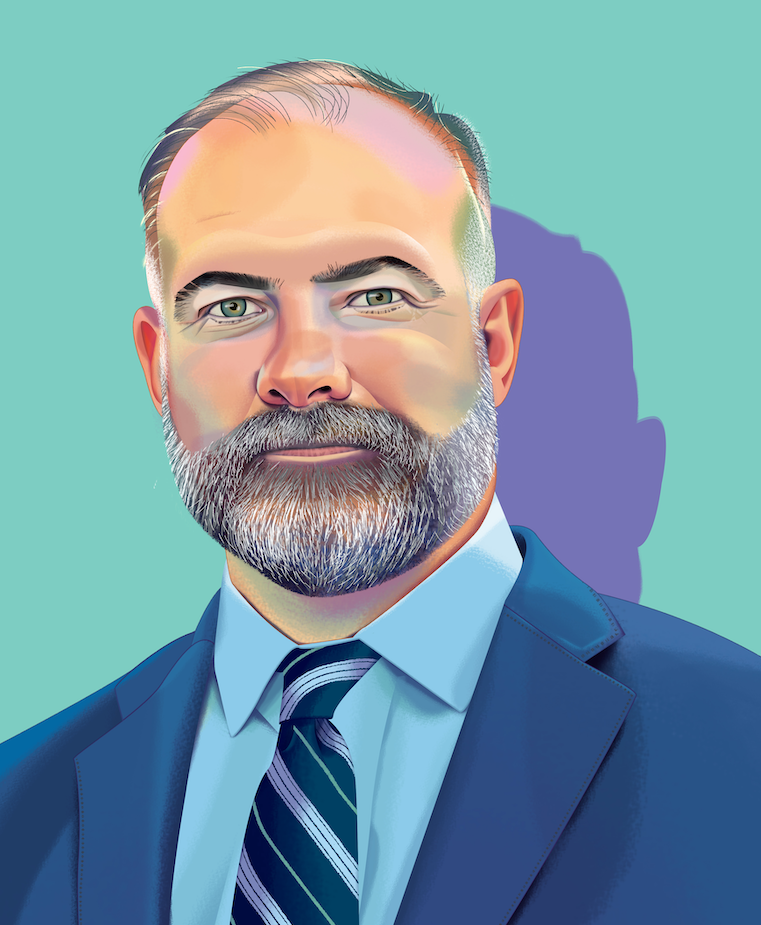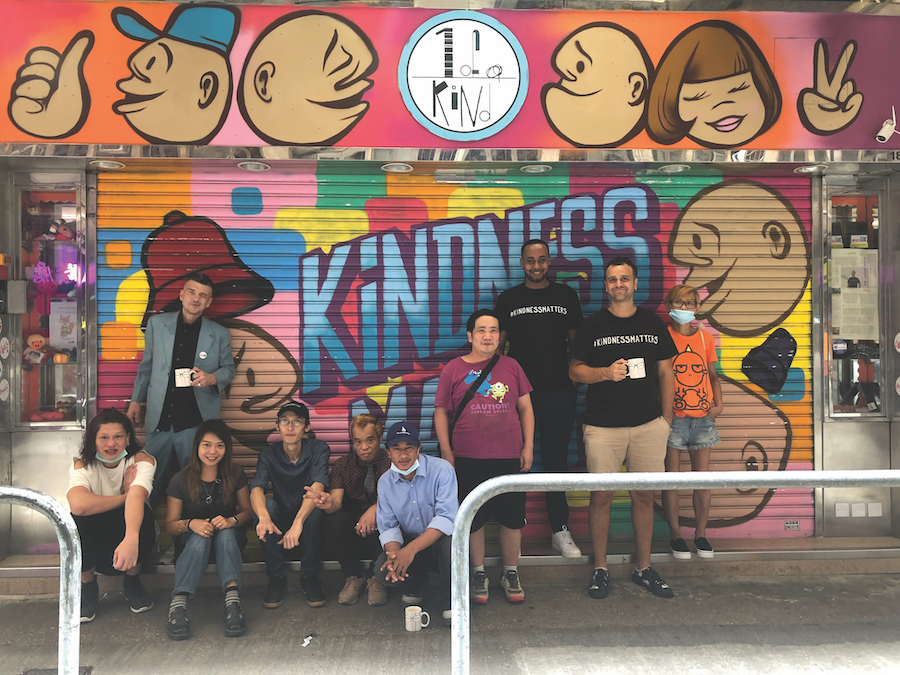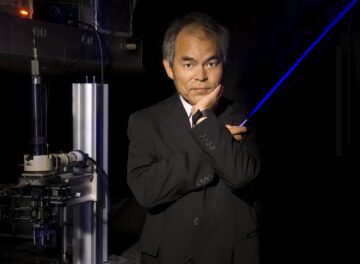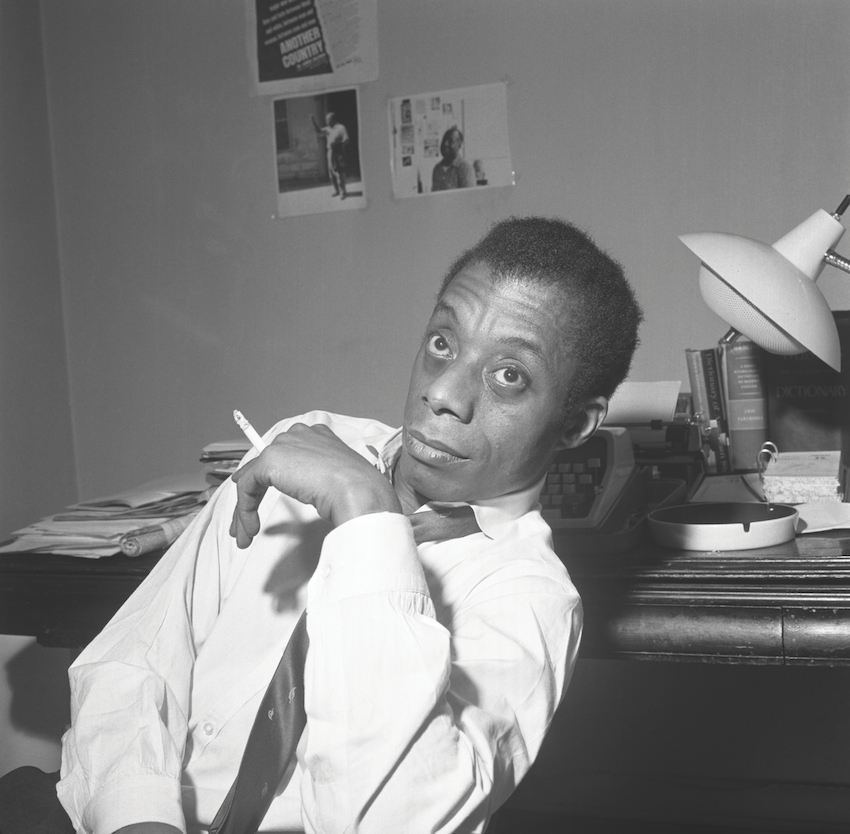Jeff Rotmeyer, founder & CEO of Hong Kong’s ImpactHK, argues that the key to resolving homelessness is within our grasp. By Brunswick’s Diane Murray and Stephanie Ma.
A desperate couple camped on a footbridge in Hong Kong’s North Point proved a turning point for Jeff Rotmeyer. He got to know them. They were immigrants from the Philippines who had been living in Hong Kong for over 20 years and had lost everything. Typical of those experiencing homelessness, they were suffering from multiple hardships which, combined, seemed insurmountable. A motorcycle accident and inadequate diabetes care created severe health problems that led to unemployment. Financial difficulties drove them to homelessness, where they also encountered immigration problems.
Then, their 5-year-old child was taken away from them by the government’s family services.
An immigrant himself, originally from Canada, Rotmeyer had met them through “kindness walks” he had been organizing with other volunteers to bring homeless people in the city food and necessities. He began helping this couple find services, throwing fundraising parties, identifying government services and places that the father—“an amazing musician, actually”—could find work.
“We were friends and I helped them as friends,” he says.
Through his intervention, they were able to secure a place to live and regular employment. Soon, reunited with their child, the family were living independently again.
“That was a really good lesson about the importance of friendship on the street,” he says. “There’s no way they could have done that on their own, just like there’s no way I could have done everything that I’ve done in my life on my own. Everybody needs help. And when you give people help, they can do it.”
That insight proved critical. “I could see how we could help people off the streets and get them a better opportunity to find health and happiness in the city,” he says.
In 2017, he left his teaching job to start ImpactHK, a nonprofit where, as CEO, he currently employs nearly 60 staff, including many of whom were previously homeless, coordinates tens of thousands of volunteers and maintains a budget of HK$29 million ($3.7 million) a year. It has so far helped about 650 people off the streets.
A global city of 7 million, Hong Kong ranks among the 10 richest urban centers in Asia. The official number of people without homes is tallied at over 1,400 at any one time, but many go uncounted and the actual number is thought to be far higher.
“A lot of people don’t comprehend how much people are struggling in this city,” Rotmeyer says, “struggling to eat and forced into situations where they’re living in inadequate, inhumane spaces like cages, coffin-box apartments. If you combine those with the people living on the street you’re looking at half a million people struggling in this city. So it’s a massive issue.”
Rotmeyer had been involved in volunteer work prior to working with the homeless community, and now runs not just ImpactHK but also Love21, a separate nonprofit he founded to work with families of people with Down syndrome and autism. But even with the management demands, he still spends a significant amount of time on the streets caring for his friends experiencing homelessness. We spoke to him from his offices in Hong Kong about his career and about what organizations internationally can learn from his success.
“I never wrote a business plan for ImpactHK, or Love21,” he says. “That was actually a huge strength of ours. It kept us agile. We’re still learning. We’re still adapting, and we’re still improving every day.”
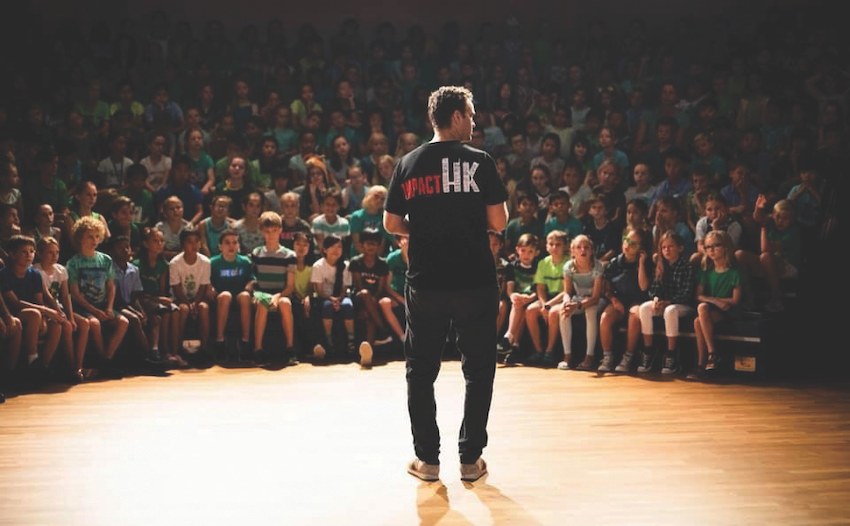
Jeff Rotmeyer speaks to a group of school children at Discovery Bay International School. The event was part of ImpactHK’s community education program aimed at cultivating empathy by sharing stories of individuals affected by homelessness and shedding light on the challenges they face.
You were in college in the US on a soccer scholarship, suffered a knee injury and stopped playing. How did you wind up here?
Yes, I had taken a very basic sports management and fine arts business degree. I didn’t really know what to do. But I finished and I kept coaching soccer and just enjoying life. But that knee injury was probably a blessing in disguise. It made me think about a new plan. I got introduced to teaching English in Korea. Within a couple months, I’d sold my car, got rid of my apartment and moved to Seoul to teach English in a crazy kindergarten. That was over 20 years ago.
I knew nothing about Asia at all. I was quite ignorant about everything really. I learned to read Korean and speak it a bit. I loved living there. Then I got an opportunity to teach English at a public primary school here, which I jumped at.
How does ImpactHK work?
Our journey basically starts when we meet people on the streets. We just try to be a caring person in their life. We can’t push or persuade or convince people off the streets. If you treat people how you’d like to be treated, I think it’s always a win. And the holistic model we use enables us to basically tailor-make the program for that specific individual.
We have our shelter program. We have a huge volunteering and feeding program. That process—volunteers learning about homelessness and learning about the importance of caring for strangers and people in need—that has a ripple effect for society. Our medical program is in-house, so we now have a full-time and a part-time nurse on staff. Counseling programs, addiction recovery programs, employment programs—a little under a quarter of our full-time staff have experienced homelessness. We also have an employment program that helps them get jobs elsewhere.
We focus a lot on education, going into schools, working with the youth. We’re going to be tripling the size of that program in the coming years. We have a huge sports and community program, with about eight to 10 sport classes a day.
Over 90% of the people we serve don’t have an emergency contact when we do an intake assessment. So sports classes and these fun activities like gardening or curling or kickboxing—they’re giving people a chance to have a laugh, have some fun, be a part of the community and have a really strong daily schedule. Every day, from the time they wake up in the morning, they’ve got things to do. They’re getting tons of human connection.
These are simply people craving love and friendship, which we all need. If you can find a way to earn their trust, that really is where it starts.
Do you think your model would work in other major cities?
I think so. Even though we’re just seven years old, I think people elsewhere can probably learn from our data. Our success rate of graduation three years ago was 36%. Now it’s close to 70%. That means that any individual stepping into our shelter, 70% of the time, they’re finding financial independence and no longer needing our support. Our programs are working.
“These are simply people craving love and friendship, which we all need. If you can find a way to earn their trust, that really is where it starts.”
Homelessness in Hong Kong is often being blamed on skyrocketing housing costs. What’s your take on that?
I don’t believe the price of property itself—or addiction to name another cause often cited—would ever cause homelessness, but they can make it very difficult to escape homelessness.
The reason we’re seeing people on the streets, in my opinion, is mostly down to the fact that they’re very alone. They don’t have that support network. If I lost all my money, I lost my job and I couldn’t afford my expensive rent, I would not become homeless. I would call my dad; I could live on his sofa. And I’ve got other friends here that would very happily take me in. When you’re working with people who are completely alone, they haven’t got those options.
I know those experiencing homelessness elsewhere in the world are often treated statistically, dehumanized. Is that true in Hong Kong as well?
Oh, yes, definitely. “Street rats” is a common expression in Hong Kong. It’s very sad.
We’re seeing constant narratives of judgment as reasons to not care for people. In the reporting, you see two different types of news. One, on harm reduction, dignity, respect, protecting their rights, et cetera. Then the other: “They’re infringing upon the rights of the public. It’s a hygiene issue. It’s a safety issue. These people need to be going away somewhere else.” Putting the blame on them, instead of having empathy and trying to understand what the solution is. And at the end of the day, there is a solution.
What ImpactHK shows is that you can actually have transformation and get people off the streets. It just takes a lot of care and a lot of hard work. I think we’re proving that it’s very doable.
People will always fall down in the world. Homelessness will never be ended. You have to make sure that you have a higher priority for caring for people in need than for judging them.
How do you handle mental health problems?
With a lot of love and care according to whatever that individual’s going through. In Hong Kong, the homeless population is much more challenging than in Vancouver, where I’m from originally. There and in most places, you’re going to see anger. That means you can identify the problem faster, and you can come up with a solution. In Hong Kong, we’re dealing with people who have buried that anger very deep, with a lot of shame and a lot of serious trauma. They don’t want to talk about it, they don’t want to face it and they’ve just given up.
That leads to drug addiction issues, people want to escape pain. They want peace. You see people with schizophrenia and psychosis. Hoarding disorder is very common here. Delusion disorders. A lot of really serious mental health challenges.
It is a very difficult community to help. They’re often not really willing to care for themselves. They’ve been dealing with counselors and social workers, sometimes their whole lives, so expecting them to want to open up and share with you completely about themselves is not really realistic, unless you first have a strong bond with them.
You have to be vulnerable yourself. You have to put your heart on the table. In our casework model, we have about a 10-to-one ratio. One social worker has about 10 friends that they work with, so it’s quite an intimate model. We have a lot of face-to-face time.
“People will always fall down in the world. Homelessness will never be ended. You have to make sure that you have a higher priority for caring for people in need than for judging them.”
We keep coming back to that, establishing a relationship with the person.
Yes, rooms don’t solve homelessness. Rooms don’t give people hope. What gives people hope is thinking, “I’m not going to be alone for the rest of my life here. I’ve actually got a mate, I’ve got a friend that cares for me, that I care for, that I want to talk to and spend time with.” We all need that. It’s very important.
As you grow, is it difficult to find people who can represent the mission?
I went from being an English teacher to now being the CEO of a charity with a HK$29 million budget, and over 60 full-time staff—it’s been quite a learning process. But I’ve really loved that part.
You definitely want to make sure that your staff have aligned values. Get to know who you’re hiring, and make sure you’re asking the questions that need to be asked. You want people that want to work with this community.
I want to hire people that have fight. People that are there for the scrap. We need to work hard to do something that’s never been done before. We aren’t looking to hire people who are too focused on their work-life balance. It’s not easy helping people who are facing incredible pain and challenges. Our team needs to be dedicated to caring for people who need a lot more than what they are typically offered.
We’ve got a really passionate team, during a very trying time in Hong Kong. I’m very proud of them.
And we’re constantly surrounded by people who are so caring in the city, the best people coming up and volunteering, donating and offering support in various ways. We get to meet amazing other leaders and people in the charity sector.
How do you deal with this personally? Confronting these tragic situations everyday?
It’s hard. I used to cry a lot. Friends dying, losing people. I invest a lot of time and care in people and then sometimes I just never see them again.
Also, my mom died last year with Parkinson’s disease. Her final years of Parkinson’s were just an absolute nightmare, and so sad. She was still in Canada. I’m an only child. I organized all of her healthcare from Hong Kong, and I was back and forth four or five times a year.
That really was the hardest point in my life, the last four years here. I was able to kind of escape into my work, which helped me cope with a lot of personal challenges.
But with all that, I’m honestly just grateful for this opportunity. I’m just loving this work. I love the community that we work with.
I feel very lucky. Yes, you have heartache. But I feel stronger now than I have in the past few years. I guess overall my main fuel is gratitude.
Lives Transformed
“I used to believe the stigma around the homeless community,” says Roni Li, Communications Manager for ImpactHK. “But once I started working here, I realized everyone has a different story. I come into contact with these stories now on a daily basis and they are nothing I could ever have imagined.”
Cindy, Senior Community Kitchen Assistant, had serious medical issues, including a heart condition, while living on the street. “I had a very tough time, living on the streets as a woman on my own,” she told us.
She knew about Jeff Rotmeyer and ImpactHK, but for a long time, resisted seeking help. She wanted to pull herself up on her own but was in no condition to rebuild her life.
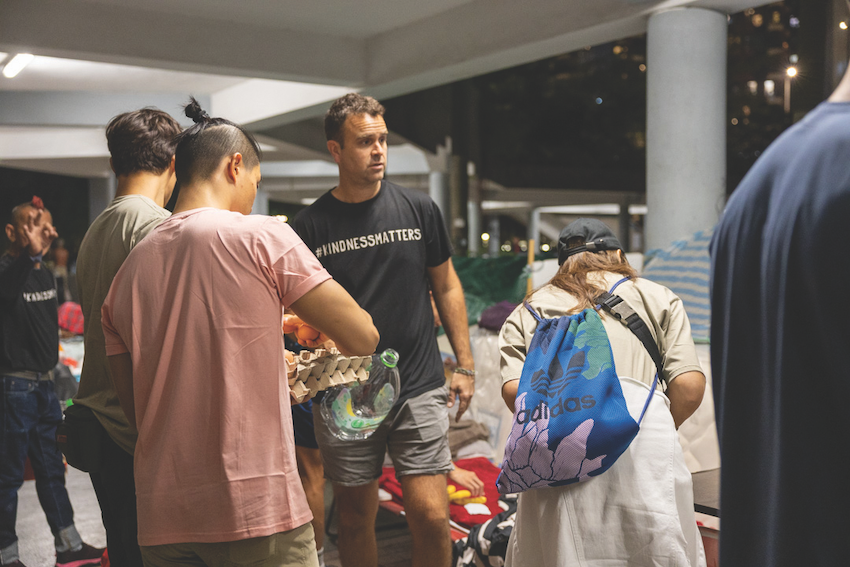
“I was very sick. I would be discharged from the hospital one day and then go back the next.” Finally, she saw that she needed help. “I realized I couldn’t get better living on the streets.” She let a social worker bring her to ImpactHK, where she got to know the organization, its services and especially its founder and CEO.
“He said, ‘Everything you need, I have. We can help get medical help, we have clothes, and we can find a place for you to stay. I don’t want you to go back to the streets.’ No one had ever spoken to me like that before, and I was very touched.”
That was five years ago. Cindy spent a year being cared for by ImpactHK-affiliated doctors and eventually started working for the organization.
Ah Lik, Senior Kindness Walk Assistant, had been living on the streets for over 10 years when he met Rotmeyer. He recalls the amount of time Rotmeyer took to talk to those living on the streets, getting to know them. After taking advantage of ImpactHK’s services, he began helping out with distributing donations.
“Jeff saw I was doing a good job,” he says. “So in 2019, I became the first homeless person to become a full-time staff at ImpactHK.”
Ah Lik now lives in a flat near the center where he works. Rotmeyer chats with him regularly, asking in particular about how others he knows are faring. It’s part of an important sense of community that Lik feels within the organization.
“What ImpactHK does is very meaningful,” he says. “The first part of my life was difficult, but the rest of my life I think is going to be OK. I am a different person now, I feel that I am much happier—I now have a job, a place to live and food to eat. I feel very happy and satisfied with where my life is right now.”
Additional Reporting by Stephanie Ma, an Account Director based in Brunswick’s Hong Kong office.
More from this issue
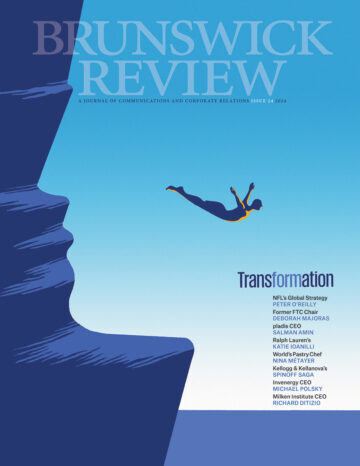
Transformation
Most read from this issue
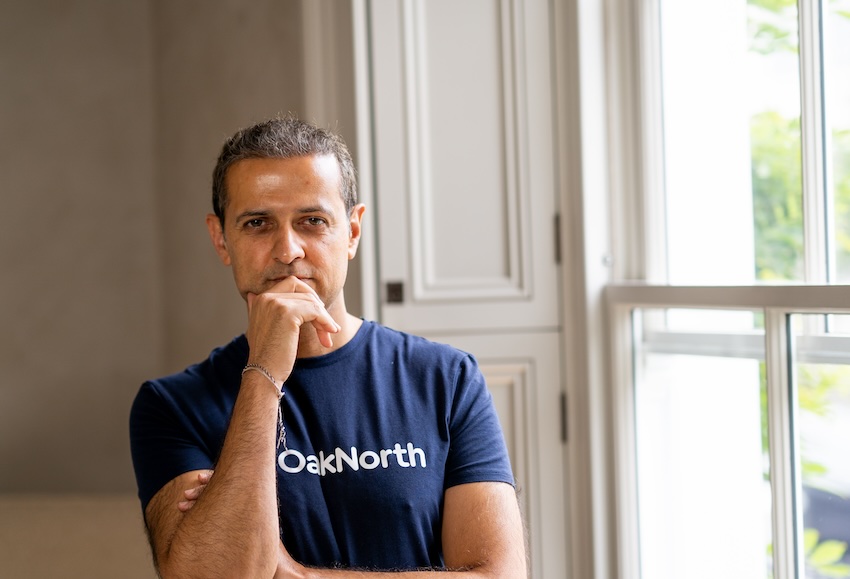
Banking on Entrepreneurs
